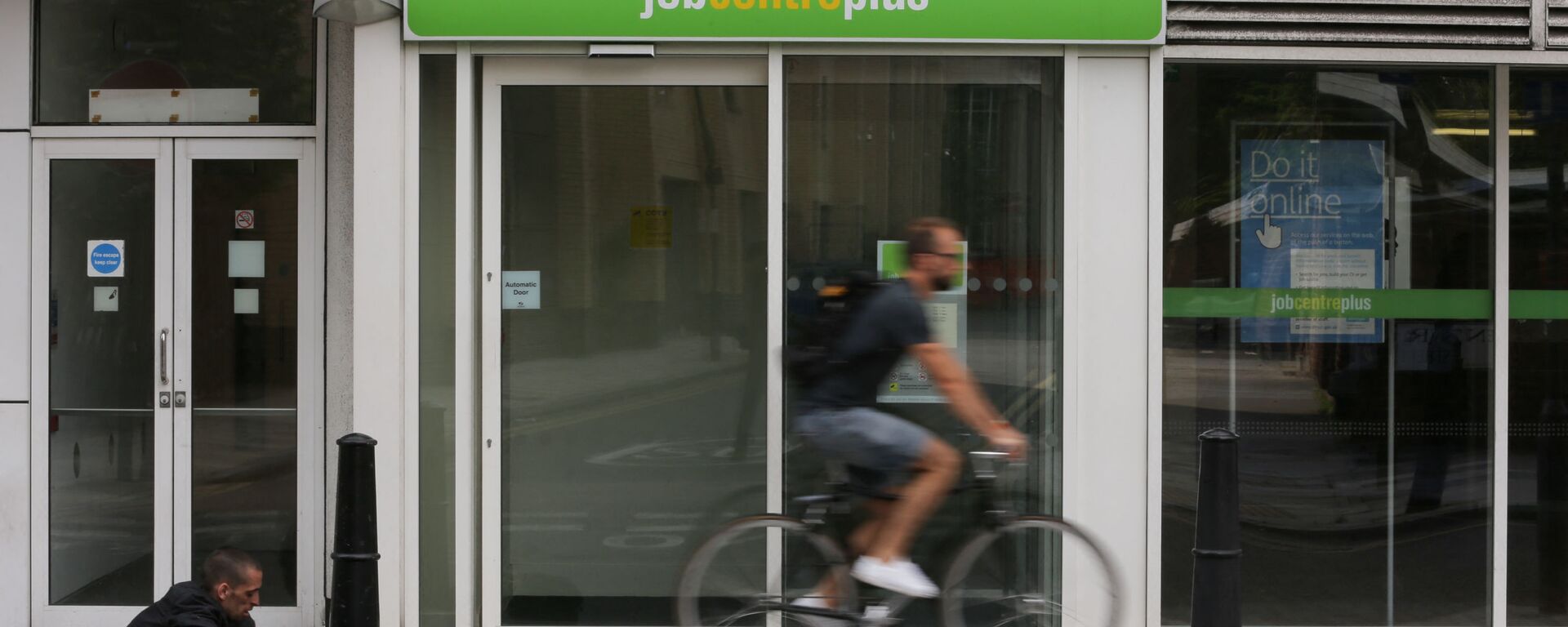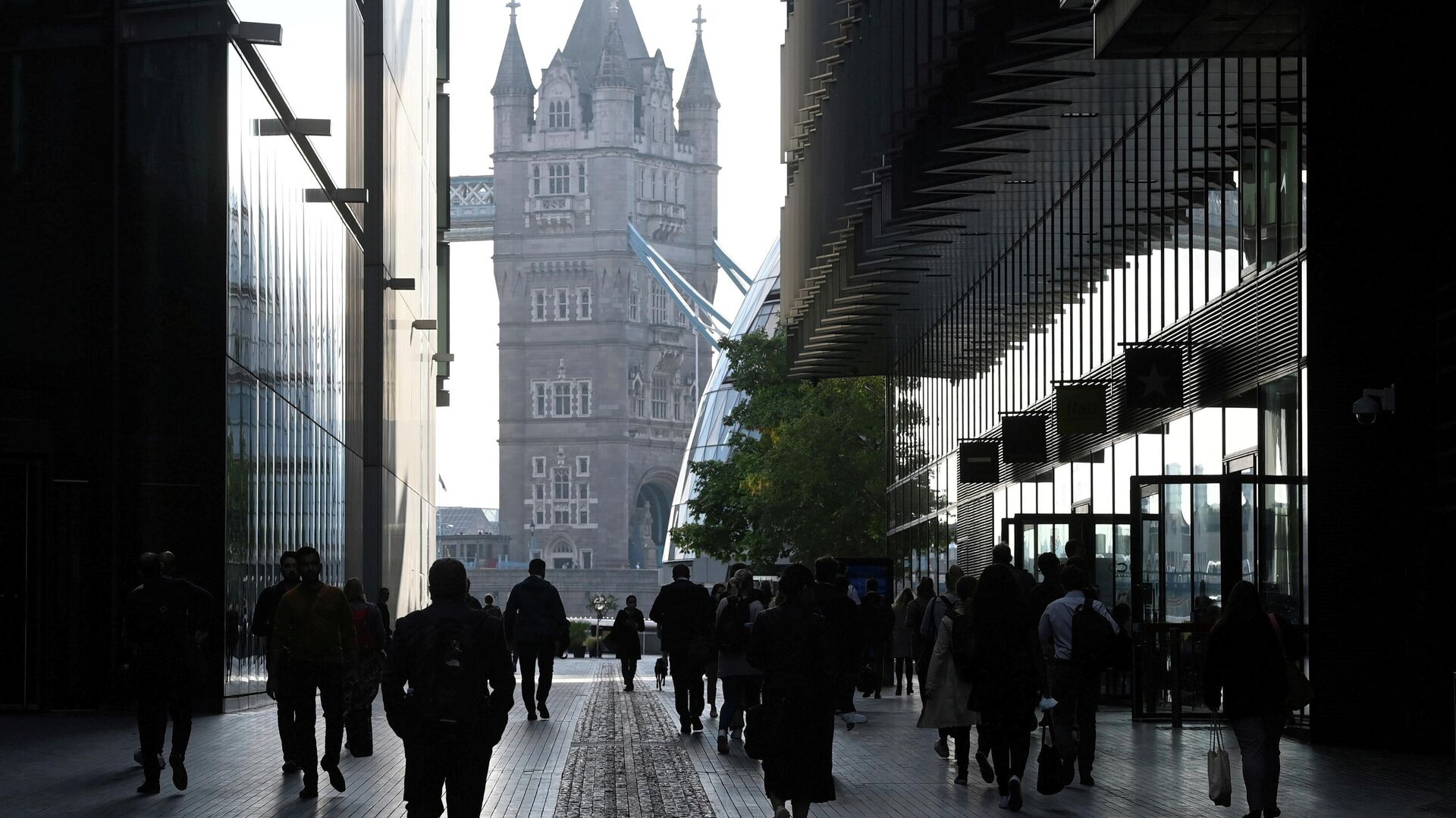https://sputnikglobe.com/20211001/uk-furlough-system-end-makes-sense-even-though-some-jobs-never-going-to-come-back-experts-say-1089576256.html
UK Furlough System End 'Makes Sense', Even Though Some Jobs 'Never Going to Come Back', Experts Say
UK Furlough System End 'Makes Sense', Even Though Some Jobs 'Never Going to Come Back', Experts Say
Sputnik International
The furlough system introduced in the United Kingdom in March 2020 to soften the impact of the unfolding coronavirus pandemic on jobs and the most vulnerable... 01.10.2021, Sputnik International
2021-10-01T11:41+0000
2021-10-01T11:41+0000
2023-05-28T15:16+0000
jobs
coronavirus
covid-19
rishi sunak
economy
united kingdom (uk)
https://cdn1.img.sputnikglobe.com/img/07e5/0a/01/1089577517_0:137:2955:1799_1920x0_80_0_0_9db30fe73dec6d8a182ceb10a894d9ea.jpg
The end of the Coronavirus Job Retention Scheme (CJRS), also known as the furlough system, has drawn diverse assessments, with the government assuring that now when the most difficult moment of the coronavirus pandemic has passed, there is no need for the measure.Yet, some forecasters - among them the Bank of England - have estimated that a small rise in unemployment may follow the dismantling of the furlough scheme. Chancellor Rishi Sunak said that he was "immensely proud" of the system, touting it as one of the factors that ensured "that the worst recession for 300 years saw the smallest rise in unemployment of any recession in living memory".Given that the suspension of the system was delayed, prolonging the scheme's initial timeline from 3 months to over a year, many, including Sunak himself, said that the CJRS was not sustainable in the long run. Professor Alex de Ruyter, a regional economist at Birmingham City University and director of the Centre for Brexit Studies, agreed with these estimations, adding that, while some sectors may no longer need government support, others, like international travel, may still struggle without it. However, the timeline for dismantling the CJRS, according to de Ruyter, is "broadly appropriate", even though he pointed at some possible adjustments.Daniel Lacalle, a chief economist at Tressis Gestion, said that the extension of the CJRS was "probably" necessary, but noted that many businesses believed that the furlough should have ended earlier due to the rapid pace of vaccination and recovery.What Are the Prospects?According to de Ruyter, British businesses have seen "quite a rapid recovery so far" - which, however, "has recently slowed". But the professor remains hopeful for the future.Lacalle echoed the sentiment but stressed that further recovery is still ahead and it is too early to say that all sectors have returned to normality. Moreover, according to the Tressis Gestion economist, "unfortunately" some jobs may never bounce back from the coronavirus-caused crisis."The temporary increase in unemployment may revert before Christmas", Lacalle suggested, commenting on concerns about the small rise in unemployment that was predicted to follow the end of the furlough.The Coronavirus Job Retention Scheme officially ended on 30 September after lasting for over a year, following its introduction in March 2020 as a measure to help to pay the wages of some 11.6 million UK workers. Initially, the government had paid 80 percent of salaries, leaving the rest to employers, but in August and September, the British authorities covered 60 percent.
https://sputnikglobe.com/20210930/as-uk-dismantles-furlough-lifeline-govt-pledges-efforts-to-maximise-employment-1089539499.html
united kingdom (uk)
Sputnik International
feedback@sputniknews.com
+74956456601
MIA „Rossiya Segodnya“
2021
News
en_EN
Sputnik International
feedback@sputniknews.com
+74956456601
MIA „Rossiya Segodnya“
Sputnik International
feedback@sputniknews.com
+74956456601
MIA „Rossiya Segodnya“
jobs, coronavirus, covid-19, rishi sunak, united kingdom (uk)
jobs, coronavirus, covid-19, rishi sunak, united kingdom (uk)
UK Furlough System End 'Makes Sense', Even Though Some Jobs 'Never Going to Come Back', Experts Say
11:41 GMT 01.10.2021 (Updated: 15:16 GMT 28.05.2023) The furlough system introduced in the United Kingdom in March 2020 to soften the impact of the unfolding coronavirus pandemic on jobs and the most vulnerable sectors of the country's economy ended on Thursday.
The end of the Coronavirus Job Retention Scheme (CJRS), also known as the furlough system, has drawn diverse assessments, with the government assuring that now when the most difficult moment of the coronavirus pandemic has passed, there is no need for the measure.
Yet, some forecasters - among them the Bank of England - have estimated that a small rise in unemployment may follow the dismantling of the furlough scheme.
Chancellor Rishi Sunak said that he was "immensely proud" of the system, touting it as one of the factors that ensured "that the worst recession for 300 years saw the smallest rise in unemployment of any recession in living memory".
Given that the suspension of the system was delayed, prolonging the scheme's initial timeline from 3 months to over a year, many, including Sunak himself, said that the CJRS was not sustainable in the long run.
Professor Alex de Ruyter, a regional economist at Birmingham City University and director of the Centre for Brexit Studies, agreed with these estimations, adding that, while some sectors may no longer need government support, others, like international travel, may still struggle without it. However, the timeline for dismantling the CJRS, according to de Ruyter, is "broadly appropriate", even though he pointed at some possible adjustments.
"A slower taper might have made sense, but I think that the pandemic has changed preferences and the labour market will need to respond to that. More important than further extensions will be putting the right support in place to enable individuals to retrain", De Ruyter said.
Daniel Lacalle, a chief economist at Tressis Gestion, said that the extension of the CJRS was "probably" necessary, but noted that many businesses believed that the furlough should have ended earlier due to the rapid pace of vaccination and recovery.
"The furlough scheme was designed as an extraordinary measure and it has been maintained due to the restrictions to some businesses", he said. "Now that those are over, it makes sense to end the scheme".

30 September 2021, 07:40 GMT
According to de Ruyter, British businesses have seen "quite a rapid recovery so far" - which, however, "has recently slowed". But the professor remains hopeful for the future.
"The primary issues now appear to be bottlenecks in the supply side (some of which are domestic and others international)", he noted. "I think that the coming winter is likely to be quite challenging but I'm hopeful that (economically at least) we will be in a much better place by mid-2022".
Lacalle echoed the sentiment but stressed that further recovery is still ahead and it is too early to say that all sectors have returned to normality. Moreover, according to the Tressis Gestion economist, "unfortunately" some jobs may never bounce back from the coronavirus-caused crisis.
"The temporary increase in unemployment may revert before Christmas", Lacalle suggested, commenting on concerns about the small rise in unemployment that was predicted to follow the end of the furlough.
The Coronavirus Job Retention Scheme officially ended on 30 September after lasting for over a year, following its introduction in March 2020 as a measure to help to pay the wages of some 11.6 million UK workers. Initially, the government had paid 80 percent of salaries, leaving the rest to employers, but in August and September, the British authorities covered 60 percent.



